In the Media + Major Awards | Great Ideas Alumni Newsletter
April 2019
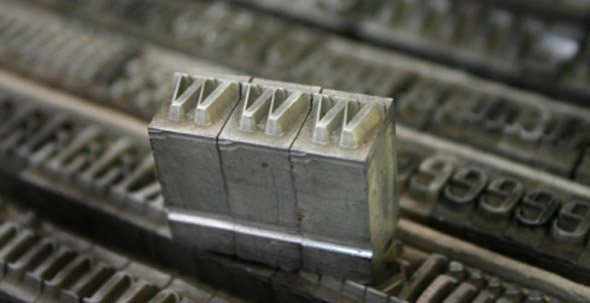
A section of the Great Ideas Alumni Newsletter
April 2019 edition
MAJOR AWARDS
FACULTY
Three MIT SHASS professors receive 2019 MacVicar Faculty Fellowships
Joshua Angrist (Economics), Graham Jones (Anthropology), and T.L. Taylor (Comparative Media Studies) of MIT SHASS, and Erik Demaine (Computer Science) of Engineering, have received the Institute's highest honor in undergraduate teaching.
Story at MIT News
LINGUISTICS
QS World University Rankings rates MIT — and MIT Lingistics — No. 1 worldwide
This is the seventh straight year that QS has ranked MIT the top university in the world. QS has also ranked Linguistics as No.1, and Economics No.2 worldwide. Earlier this year, Times Higher Education ranked MIT No.2 worldwide for the Arts and Humanities and No.1 worldwide for Economics.
QS story at MIT News | Times Higher Education rankings
ECONOMICS
The decade's eight best economists
Of the eight selected, two are MIT economics professors and five are MIT economics graduates. "Taken together, they display an impressive combination of clever empiricism and serious-minded wonkery. They represent much of what’s right with economics as well as the acumen of top American universities in scooping up talent."
Story at The Economist
ECONOMICS
Five from MIT win 2019 Paul and Daisy Soros Fellowships for New Americans
Two MIT alumnae and three current MIT doctoral students — including Indira Puri in Economics — are among this year’s 30 recipients of The Paul and Daisy Soros Fellowships for New Americans, each of whom receives up to $90,000 to fund their doctoral education.
Story
ECONOMICS
Indira Puri named a 2019 Paul & Daisy Soros Fellow
Selected from a pool of 1,767 applicants for their potential to make significant contributions to United States society, culture, or their academic fields, the Fellows receive up to $90,000 to fund their doctoral education. Indira Puri whol holds degrees in mathematics, computer science, and economoics, is a PhD candidate in economics in MIT SHASS.
Past Fellows from MIT
MUSIC AND THEATER ARTS
Ken Urban awarded Tishman Playwrights Creativity prize from New Dramatists
The prize will support the development of Urban's new play "Danger and Opportunity," a comedy about a married gay couple.
About Ken Urban's work
BURCHARD SCHOLARS PROGRAM
36 outstanding MIT students selected as 2019 Burchard Scholars
We are proud to announce the extraordinary sophomores and junior students selected as the 2019 cohort of Burchard Scholars. In this competitive MIT SHASS discovery program, students expand their intellectual horizons and develop leadership skills.
Meet the new Burchard Scholars
KNIGHT SCIENCE JOURNALISM PROGRAM AT MIT
Undark magazine wins 2019 Polk Award for environmental reporting
Photojournalist Larry C. Price and reporters for Undark magazine win for “Breathtaking,” a global portrayal of the lethal impacts of particulate pollution. For the multimedia series, directed by editor-in-chief Tom Zeller, Jr., Undark visited seven locations on five continents.
View the series: Breathtaking | Undark | KSJ@MIT
MUSIC AND THEATER ARTS
Charlotte Brathwaite wins 2019 Creative Capital Award
Forgotten Paradise: Gazette’s Sun is an experiment in creative nonfiction filmmaking, installation, and live performance. It traces the lineage of Director Charlotte Brathwaite’s family history against the backdrop of the trans-Atlantic slave trade.
More
ECONOMICS
Nikhil Agarwal selected as a 2019 Sloan Fellow
Agarwal, the Castle Krob Career Development Assistant Professor of Economics, studies the empirics of matching markets. Sloan Fellows are nominated on “the basis of a candidate’s research accomplishments, creativity, and potential to become a leader in his or her field.”
Story at MIT News | Nikhil Agarwal
KNIGHT SCIENCE JOURNALISM PROGRAM AT MIT
Gulf Stream Series wins the McElheny Award
The inaugural McElheny Award for local and regional science journalism goes to a team of reporters from the Charleston Post and Courier, for a series that sheds light on a little-known impact of climate change and an overlooked risk of offshore drilling in the eastern U.S.
Award Story | Read Part I of the Series | About the Award
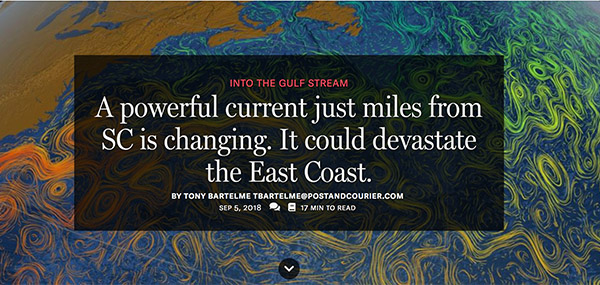
"Off South Carolina, the ocean suddenly changes color, from green to deep blue. You’re in the Gulf Stream now, in warm and salty water from the tropics, with swordfish, tuna and squid, in a current so strong that it lowers our sea level."
RECENT STORIES IN THE MEDIA
DEMOCRACY AND CIVIL RIGHTS
ECONOMICS AND DEMOCRACY
The Democracy Dividend: Faster Growth | Daron Acemoglu
Countries that democratize — switch from a nondemocratic regime such as a dictatorship, monarchy, or autocracy to a democratic regime — grow more rapidly in the next 20 years or so, and end up with 20 percent higher income per capita.
Bloomberg News
POLITICAL SCIENCE
Civil rights and restorative justice | Melissa Nobles
In this CBS news video, Dean Nobles and Margaret Burnham, who lead the Civil Rights & Restorative Justice project, discuss their work on anti-civil rights violence in the U.S. between 1930-1970. "We are beginning to change the narrative," said Nobles, "such that families who had that violence visited upon them can now talk about it — and it can be understood."
Story on CBS | Related: 60 Minutes: National Memorial for Peace and Justice
GUN CULTURE
SCIENCE WRITING
The common ground on gun safety | Tom Levenson
"Between the pro-gun side and those who want to get rid of guns there’s 'a little oval, where both sides agree. That’s the culture of safety." Levenson, a professor of science writing and an "Ideas" columnist for The Boston Globe, describes the current research and efforts to increase gun safety in the U.S.
Commentary in The Boston Globe
CENTER FOR INTERNATIONAL STUDIES
On reducing gun violence | John Tirman
"America’s gun culture is a resilient fact of political life," writes Tirman, the Executive Director and Principal Research Scientist, Center for International Studies. "Attempts to reverse the country’s appetite for firearms have largely failed, even as gun violence persists at an astonishing pace. Lately, however, a social movement to challenge gun culture has rocked politics for the first time in a generation."
Commentary
ELECTIONS AND VOTING
POLITICAL SCIENCE | ELECTION LAB
Where people show up to vote — and where they don't
To calculate county-level voter turnout, we relied on two data sets: total votes cast in the 2016 presidential election, compiled from official sources by the MIT Election Data & Science Lab, and total citizen voting-age population as calculated by the Census Bureau.
Story at Washington Post
POLITICAL SCIENCE | ELECTION LAB
Broken machines and user error are leading to hour-long lines at polling booths
It's unclear what kind of impact delays caused by broken machines have on actual turnout, says Charles Stewart, director at MIT's Election Lab, which collects and analyzes election data.
Story at Quartz
POLITICAL SCIENCE | ELECTION LAB
Early voting challenges in North Carolina
For voters, convenience trumps longer hours, said Charles Stewart III, an MIT political scientist who studies voting administration. "There's a lot of research that suggests that whenever a polling place moves further away from a voter, they are less likely to vote there," Stewart said.
Commentary at NPR
POLITICAL SCIENCE | ELECTION LAB
Voting machine meltdowns are normal — that's the problem
Based on the social media deluge, it certainly felt like the entire election system was melting down at a rate the country has never seen before. But was it? Charles Stewart III, a professor of political science at MIT and a member of the MIT Voting Project, says it's far too early to tell. "We’re going to have to wait for the data to come in," says Stewart.
Story at Wired
POLITICAL SCIENCE
Uncommon knowledge: incarceration and voting
Ariel White, a political scientist at MIT, analyzed data on first-time misdemeanor defendants in Harris County (Houston), Texas, and found that black defendants who got jail time because they were randomly assigned to a more punitive courtroom were significantly less likely to vote in the next presidential election.
Story at Boston Globe
POLITICAL SCIENCE
Stop voter suppression
In North Carolina 158 polling places were permanently closed in the 40 counties with the most African American voters just before the 2016 election, leading to a 16 percent decline in African American early voting in that state.
Commentary at Salon
POLITICAL SCIENCE | ELECTION LAB
Republicans are casting doubt on normal election processes for the sake of winning
Charles Stewart, the director of the MIT Election Lab, noted that, in addition to trying to deal with mailed-in ballots, counties also had to tally their early votes. Florida law doesn't allow officials to count early votes until after the polls have closed.
Huffington Post
POLITICAL SCIENCE
Voter suppression in the U.S. | Adam Berinsky
The silver lining: studies have found that new voting restrictions have only a small impact on voter turnout. What most matters in elections, MIT political science professor Adam Berinsky wrote in 2016, is “[p]olitical interest and engagement.”
Story at Vox
POLITICAL SCIENCE
When Medicaid expands, more people vote | Andrea Campbell
“These are programs that have a major effect on people's lives,” said Campbell, who wrote a book on the political legacy of Social Security. She suggests Medicaid could work similarly, by improving people's circumstances and making them more aware of the stakes of government action.
Story at The New York Times
At the Idaho Statehouse in July, a ceremonial delivery of voter petitions from various counties requesting inclusion of a Medicaid expansion initiative on the ballot. The measure won the support of voters on Tuesday. PhotoCredit Darin Oswald/Idaho Statesman, via Associated Press
CULTURE OF INNOVATION
ONLINE EDUCATION
Are MOOC achieving their goals? | Reich and Ruipérez-Valiente
In an article in Science entitled "The MOOC Pivot" (sub. req.), MIT's Justin Reich and José A. Ruipérez-Valiente find that MOOCs are falling short of the mission to transform education worldwide
Story at Inside Higher Ed
PRIVACY AND SOCIAL MEDIA
Has Facebook been good for the world? | Turkle
Sherry Turkle, author of Life on the Screen and clinical psychologist at MIT: "Technology is the architect of our intimacies. When, 10 years ago, I first began studying how people felt about their lives in Facebook's private/public gray zone, one young woman said it was all the same to her: 'Who would care about me and my little life?'"
Story at Vox
COMPARATIVE MEDIA STUDIES
T.L. Taylor on gamergate, livestreaming and esports
Gamergate was "a kind of template or dress rehearsal for the alt-right movement."
Story / Interview at Public Books
MIT GAME LAB
'Fortnite' held a Marshmello concert — and it's the future of the multiverse.
That word, "presence," has long been used to describe the game-changing conceptual phenomenon of VR, but according to Mikael Jakobsson, a research scientist at MIT Game Lab, immersion comes in all kinds of shapes. "The Fortnite phenomenon shows it doesn't take that much technological connection for people to feel that they are together in a virtual place — to make friends, and to start caring about what happens to their characters."
Story at Wired
ROBOTICS, ECONOMICS, AND AGING
An aging world needs more resourceful robots | Acemoglu and Restrepo
Daron Acemoglu of MIT and Pascual Restrepo of Boston University show that, between 1993 and 2014, the countries that invested the most in robotics were those that were ageing the fastest — measured as a rise in the ratio of people over 56 compared with those aged 26-55. The authors posit a rule of thumb: a ten-point rise in their ageing ratio is associated with 0.9 extra robots per thousand workers.
Story at The Economist
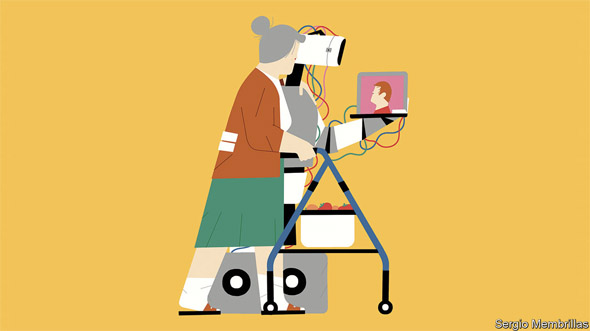
image via The Economist/Sergio Membrillas
HEALTH AND HEALTHCARE
ECONOMICS
It will take more than transparency to reduce drug prices | Sara Fisher Ellison
But economists and analysts, who applaud the efforts to bring clarity to what is now a murky pricing system, doubt the effort will actually cut total spending on prescription drugs. "They're trying to ... improve the function of the market," says Sara Fisher Ellison, a health economist at the Massachusetts Institute of Technology. "But, to be honest, they probably missed the mark."
Story at NPR
KNIGHT SCIENCE JOURNALISM PROGRAM AT MIT
Q&A with Deborash Blum, author of The Poison Squad
Blum has spent a decade researching and writing about Wiley, who was chief chemist at the US Department of Agriculture at a time when the food system was almost completely unregulated.
Interview at The Boston Globe
HEALTH ECONOMICS
On the sale of Athenahealth | Jon Gruber
MIT health economist Gruber spoke with WGBH "All Things Considered" host Barbara Howard about what the sale of Athenahealth means.
Interview at WGBH
PHILOSOPHY
Academics are being harassed over their research into transgender issues
"We maintain that it is not transphobic to investigate and analyse this area from a range of critical academic perspectives. We urge the government to take the lead in protecting research from ideologically-driven attack."
Letter at the Guardian
JOBS AND ECONOMIC HEALTH
LABOR ECONOMICS
One big thing: The uprising for higher wages | David Autor
Autor, one of the world's most respected labor economists, said low unemployment would have to continue for many years to reverse the decades of flat wages.
Story at Axios
CHANGES IN WORK AND THE WELL-BEING OF MEN
The fight over men is shaping our political future | Autor
"The greatest adverse shock to the psychosocial welfare of U.S. men has not stemmed from dysfunctional notions of masculinity (not that these are above reproach) nor from #MeToo (which was long overdue) but from deep secular labor market forces — both technological and trade-induced — that have over nearly four decades reduced the demand for skilled blue collar work.'"
Story at The New York Times
COMPARATIVE MEDIA STUDIES
Google employee protests are part of new tech resistance | Sasha Costanza-Chock
“The Google walkout amplifies the wave of tech worker organizing that we see in #TechWontBuildIt and #NoTechforICE,” says Sasha Costanza-Chock, associate professor of civic media at MIT.
Story at CNBC
IMPACT OF TECHNOLOGY ON BLUE COLLAR WORKERS
Tech is splitting the U.S. work force in two | Acemoglu
“The view that we should not worry about any of these things and follow technology to wherever it will go is insane,” said MIT economist Daron Acemoglu. The growing awareness of robots' impact on the working class raises anew a very old question: Could automation go too far? Acemoglu and Pascual Restrepo of Boston University argue that businesses are not even reaping large rewards for the money they are spending to replace their workers with machines.
Story at The New York Times
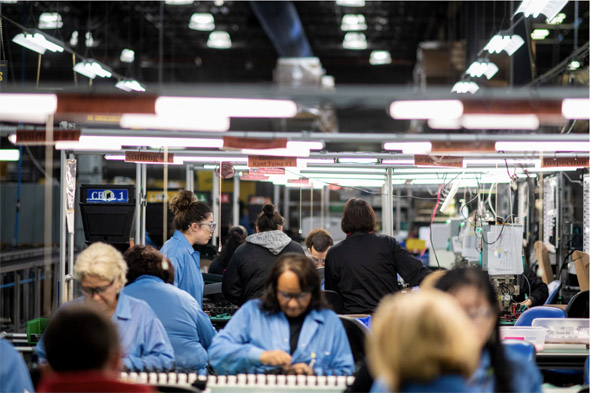
Image via Dominic Valente for The New York Times
TRADE
Trump’s dismal popularity among foreigners may be costing the US billions in exports
Rose, who has been at the University of California for more than 30 years, previously worked at the World Bank, the U.S. Treasury Department and at central banks in more than one dozen countries around the world. He holds at Ph.D. in Monetary Economics from MIT. In a prior study, Rose found that holding other things constant, a country’s exports are higher if it is perceived by the importer to be exerting more positive global influence.
CNBC
SECURITY IN OLD AGE
Working to 70 is not an easy fix to the retirement crisis | Poterba
James Poterba, an MIT economics professor, pointed to the problem at a Brookings Institution forum on the topic last week. “Not everybody can work longer,” said Poterba, who is also president of the National Bureau of Economic Research. He contrasted workers in physically demanding or unpleasant jobs to economists in academic offices comfortably churning out studies on Social Security fixes.
Story at Reuters
CLEAN ENERGY
A Green New Deal is already happening
People believe a Green New Deal will be enormously expensive — we think of FDR's vast public spending in the wake of the Great Depression, and assume hundreds of billions in upfront investment. But the real story is that we've already seen huge payoffs on the relatively modest investments made on clean energy. A recent paper from MIT shows how public investment helped deliver today's incredibly cheap solar power systems.
Story by BuzzFeed News
TAX POLICY
Economic experts analyze Elizabeth Warren's tax proposal | Gruber
Warren's tax, the brainchild of UC Berkeley economists Emmanuel Saez (MIT PhD '99) and Gabriel Zucman, would impose an annual 2 percent tax on households worth more than $50 million and a 3 percent tax on ones worth more than $1 billion, overall impacting an estimated 75,000 households. According to Jonathan Gruber, Ford Professor of Economics at MIT, Warren's proposal could be a powerful tool to grow the economy.”
Story at WGBH
TAX POLICY
Elizabeth Warren's wealth tax is an old idea and its time has come | Gruber
Economists who have looked into tax avoidance have reached differing conclusions. A recent study of Switzerland, which has long administered a wealth tax at the level of individual cantons, found that a “0.1 percentage-point increase in wealth taxes leads to 3.4% lower wealth holdings in the cross canton data.” That's a big impact. “When you tax people's wealth, they manage to somehow reduce their taxable wealth,” Jonathan Gruber, an MIT economist who was one of the authors of the study. Gruber added, “Elizabeth Warren's tax would raise money, it's a question of how much.”
Story at The New Yorker + Related analysis at The Washington Post
LABOR ECONOMICS
Loss of middle-skilled jobs is increasing inequality in urban areas | Autor and Fournier
Autor and Fournier find that, for workers who did not go to college, a larger share of middle-skilled work has been replaced by low-skilled jobs. Though the proportion of Americans who don’t attend college has been falling, this still represents about one-third of the working-age population. In perhaps the most innovative part of their research, Autor and Fournier show that the move from middle-skilled to low-skilled work among less-educated workers has been particularly prominent in cities.
Story at Quartz

Image via Reuters/Brian Snyder
INTERNATIONAL RELATIONS
SECURITY STUDIES | VIPIN NARANG
North Korea pulls out of liaison office with the South in blow to warming ties
Vipin Narang, an associate professor of political science at MIT, described the latest development as “ominous” but agreed it was more likely a pressure tactic than a sign of an irrevocable rift. “The optimistic view is it is very calibrated signaling designed to get the U.S. to move away from insisting on complete surrender up front,” he said.
Story at The Washington Post
India's anti-satellite test wasn't really about satellites
Experts like Vipin Narang, an associate professor of political science at MIT, think that India's anti-satellite test probably didn't have much to do with satellites. Narang says, India's anti-satellite test is difficult to make sense of because it is “both more dependent on satellites than Pakistan and it's also less capable in a relative sense than China.”
Story at Wired
Is North Korea giving up its nukes? It's not.
MIT security studies expert Narang points out that the North Koreans consider “final, fully verified denuclearization” to be the denuclearization of North Korea and the United States.
The Boston Globe
North Korea keeping up work on missile sites, report says
Progress on diplomacy and denuclearization has been slow and it is naive to expect Kim to halt progress on the short-range missiles used to fend off a conventional-weapon attack, says Vipin Narang, an MIT nuclear expert and political scientist.
Story at the Wall Street Journal
North Korea maintaining more than a dozen missile launch sites, photos show
"Kim said he would mass produce ballistic missiles and nuclear warheads in his New Year's Day speech this year, and that is exactly what he is doing,” said Vipin Narang, an expert on the North Korean nuclear programme."
Story at The Guardian
US/KOREA NEGOTIATIONS
Winning the nuclear game against North Korea
I talked to Vipin Narang, a political science professor at MIT. While not a game theorist himself, Narang's beautiful mind is pushing forward on how traditional nuclear deterrence strategy can be modernized for the new era of great-power conflict. "It's really about a strategic logic — how your adversary behaves based on your moves and how you react to their reaction to your moves."
Conversation at Bloomberg
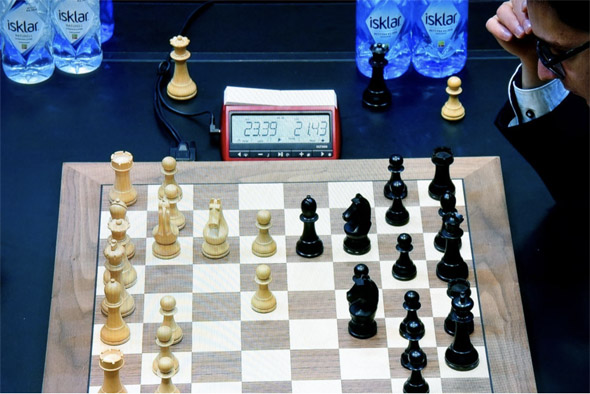
Nicky J. Sims/Getty Images for Kaspersky Lab
____________________________________
POLITICAL SCIENCE
How China plays into Trump's decision to pull of out INF treaty | M. Taylor Fravel
Many analysts believe it's unlikely that China would be interested in joining either the INF or another treaty. “Given the size of China's conventional ballistic arsenal, this would be require some very creative diplomacy!” wrote M. Taylor Fravel, an associate professor of political science at MIT.
Article at the Washington Post
CENTER FOR INTERNATIONAL STUDIES
Shinzo Abe says Japan is China's 'partner,' and no longer its aid donor
Yu Tiejun, vice president of the Institute of International and Strategic Studies at Peking University and a visiting scholar at MIT, said that many Chinese knew little about the aid the Japan provides to China.
Story at The New York Times
POVERTY ALLEVIATION
ABDUL LATIF JAMEEL POVERTY ACTION LAB | MIT ECONOMICS
How postcards solved the problem of disappearing rice | Abhijit Banerjee and Ben Olken
Banerjee and Olken speak with NPR about their work to improve Indonesia’s Raskin program (Rice for the Poor). "There's a tendency to assume that the solution to a complex problem has to be complex,” says Banerjee. “I don't think that's always true."
Story and Interview on NPR
J-PAL
Give a man a fish, he eats for a day. But if you lobby for better fishing policy…
In 2018, it recommended a grant to the Innovation in Government Initiative, part of the Abdul Latif Jameel Poverty Action Lab (J-PAL) at MIT, which provides technical assistance to governments trying to scale up proven antipoverty programs, as well as partnering researchers with national governments interested in answering questions around national policy.
Story at Vox

A laborer arranges sacks of rice at a market in Jakarta. Photocredit: Jewel Samad /AFP/Getty Images